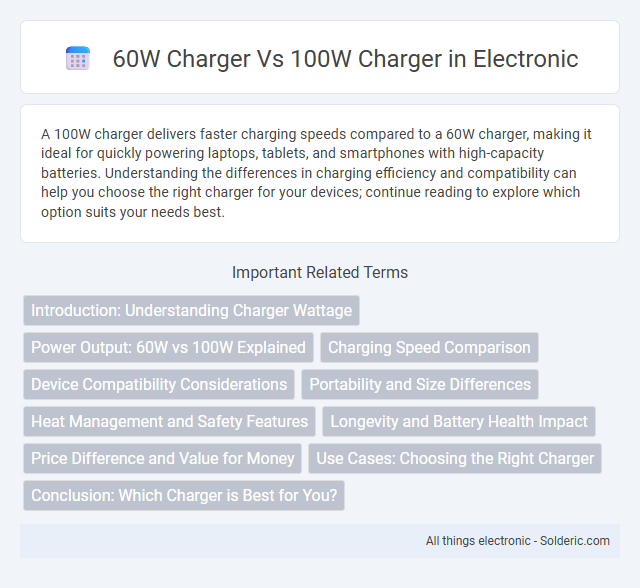A 100W charger delivers faster charging speeds compared to a 60W charger, making it ideal for quickly powering laptops, tablets, and smartphones with high-capacity batteries. Understanding the differences in charging efficiency and compatibility can help you choose the right charger for your devices; continue reading to explore which option suits your needs best.
Comparison Table
| Feature | 60W Charger | 100W Charger |
|---|---|---|
| Power Output | 60 Watts | 100 Watts |
| Charging Speed | Moderate, suitable for smartphones, tablets, laptops | Fast, ideal for high-power devices like gaming laptops and fast charging |
| Device Compatibility | Smartphones, tablets, ultrabooks | Laptops, high-performance devices, smartphones, tablets |
| Size & Portability | Smaller, lightweight | Larger, slightly heavier |
| Cost | Generally lower price | Higher price due to power capacity |
| Heat Generation | Lower | Higher, requires better cooling |
| Use Case | Everyday charging, travel-friendly | Power-intensive charging, professional use |
Introduction: Understanding Charger Wattage
A 60W charger provides sufficient power for most smartphones and tablets, ensuring steady and safe charging without overheating. A 100W charger delivers faster charging speeds, benefiting high-performance laptops and devices that require substantial power intake. Choosing the right charger wattage impacts charging efficiency and device longevity, so selecting a charger that matches Your device's power needs is crucial.
Power Output: 60W vs 100W Explained
A 60W charger delivers sufficient power for everyday devices like smartphones, tablets, and some laptops, providing balanced charging without overheating. A 100W charger offers significantly higher power output, enabling faster charging speeds for power-hungry laptops and multiple devices simultaneously. Choosing between a 60W and 100W charger depends on your device's power requirements and how quickly you need it fully charged.
Charging Speed Comparison
A 100W charger delivers significantly faster charging speeds compared to a 60W charger, reducing device charge time by up to 40%. Devices supporting higher wattage input, such as laptops and smartphones with USB Power Delivery 3.0, benefit most from the increased power output. Charging efficiency improves with optimized chargers that match device capabilities, minimizing heat generation and preserving battery health.
Device Compatibility Considerations
A 60W charger is typically compatible with smartphones, tablets, and some laptops, providing sufficient power for everyday use without overheating. A 100W charger supports a wider range of devices, including high-performance laptops and fast-charging smartphones, ensuring faster charging times and better efficiency. When choosing Your charger, consider the power requirements of Your device to avoid undercharging or damaging the battery.
Portability and Size Differences
A 60W charger typically features a more compact and lightweight design, enhancing portability for daily use and travel. In contrast, a 100W charger is generally larger and heavier due to increased power components, which may reduce convenience for on-the-go users. Users seeking a balance between charging speed and ease of transport often prefer the 60W charger for its superior portability despite the lower wattage.
Heat Management and Safety Features
A 60W charger typically generates less heat due to lower power output, which can enhance heat management and reduce the risk of overheating, making it safer for prolonged use. In contrast, a 100W charger delivers higher power, requiring advanced heat dissipation technologies such as built-in fans or heat sinks to maintain optimal temperature and prevent damage to your device. Choosing a charger with integrated safety features like overcurrent protection, temperature control, and short-circuit prevention is essential to ensure safe and efficient charging regardless of wattage.
Longevity and Battery Health Impact
A 60W charger generally delivers slower charging currents, which reduces heat generation and can help maintain your device's battery longevity compared to a 100W charger. High-wattage chargers like 100W provide faster charging but may cause increased heat and stress on the battery cells, potentially accelerating battery degradation over time. Prioritizing moderate charging power ensures better long-term battery health and consistent device performance.
Price Difference and Value for Money
A 60W charger typically costs less and is suitable for everyday devices, offering a balance between price and charging speed. A 100W charger, while more expensive, provides faster charging for high-power devices like laptops and tablets, delivering better value for heavy users. Your choice depends on whether you prioritize cost savings or need the higher wattage for quicker, more efficient charging.
Use Cases: Choosing the Right Charger
A 60W charger is ideal for smartphones, tablets, and lightweight laptops, providing efficient charging with portability for everyday use. A 100W charger suits power-hungry devices like high-performance laptops and fast-charging compatible gadgets, enabling quicker recharge times and supporting multiple devices simultaneously. Selecting between 60W and 100W chargers depends on device power requirements, charging speed preferences, and the need for versatility in multi-device environments.
Conclusion: Which Charger is Best for You?
A 60W charger is ideal for everyday use, efficiently powering smartphones, tablets, and most laptops without overheating or overconsuming energy. A 100W charger, however, offers faster charging speeds and supports high-power devices like gaming laptops and USB-C power stations, making it suitable for professionals with more demanding power needs. Your best choice depends on your device compatibility and charging speed preferences.
60W charger vs 100W charger Infographic

 solderic.com
solderic.com